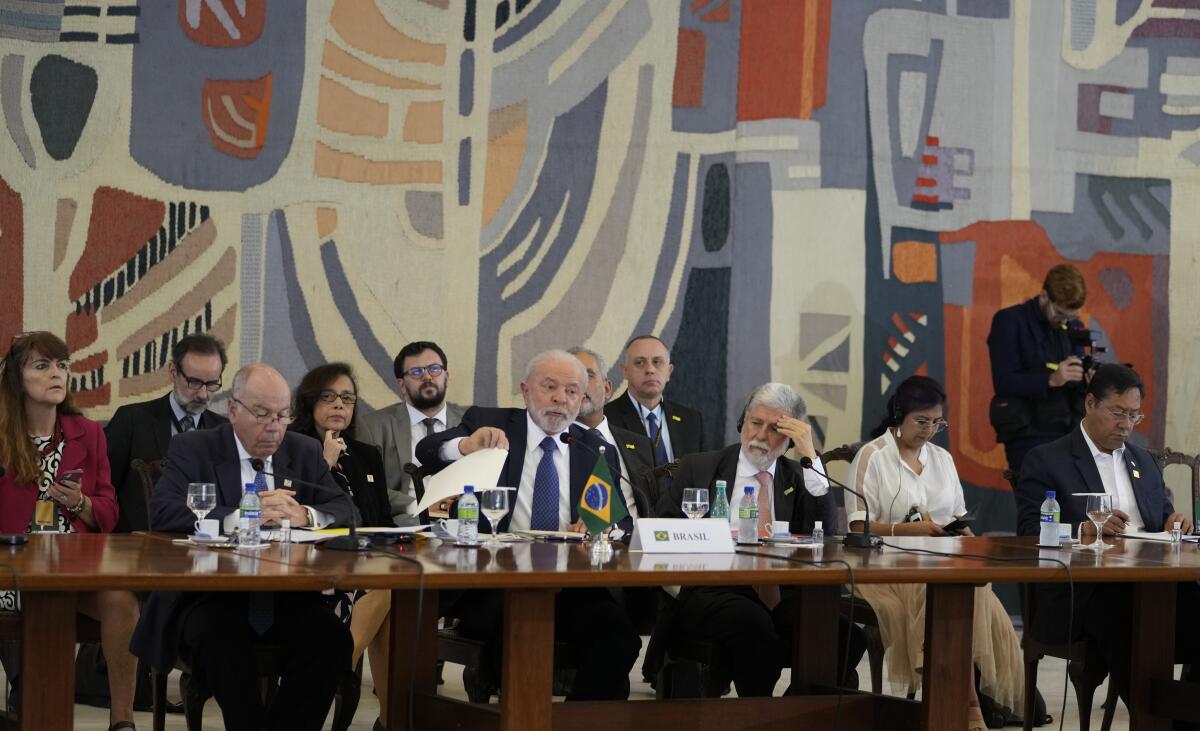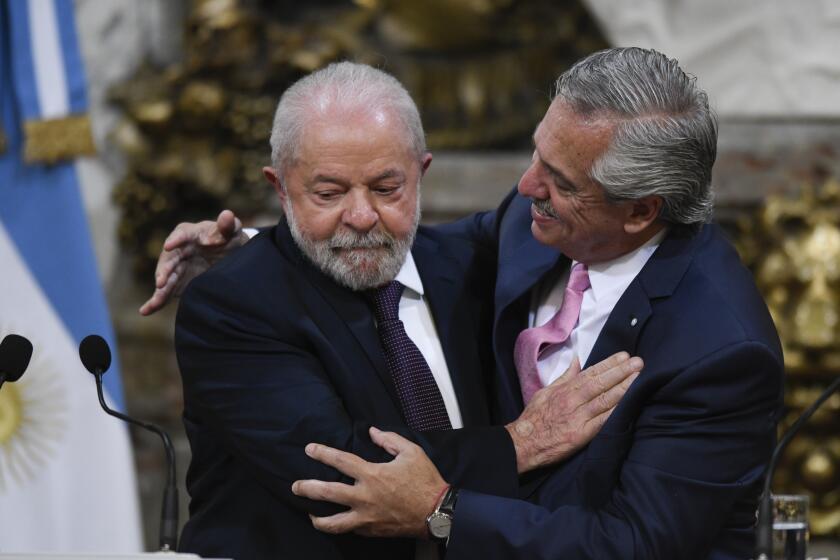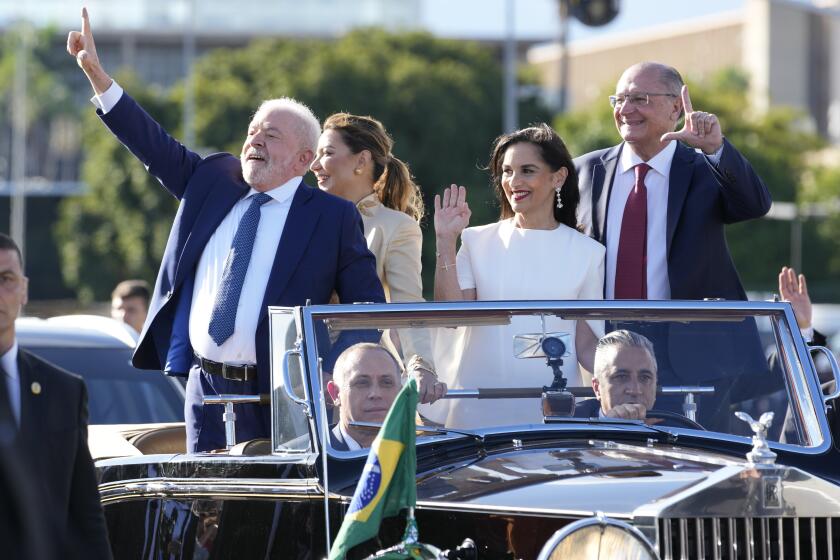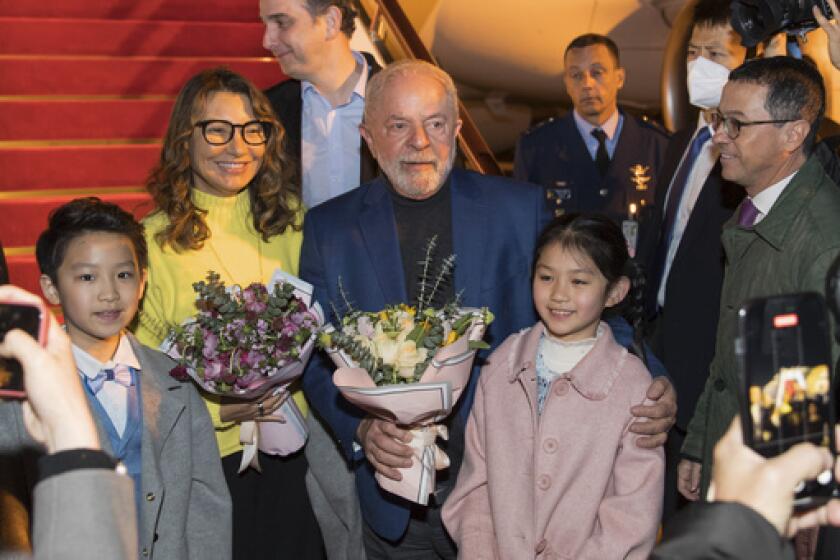Brazil’s president proposes South American currency while hosting regional summit

- Share via
BRASILIA — Brazil’s president proposed the creation of a regional trade currency to rival the U.S. dollar on Tuesday as he hosted a regional summit in a bid to revive a bloc of South America’s 12 politically polarized countries.
The Union of South American Nations, or Unasur, was launched in 2008 to boost cooperation, but became largely defunct about a decade later in disputes over leadership. Countries with right-leaning leaders at the time — including Brazil — saw the bloc as having a leftist bent and objected especially to the inclusion of Venezuela’s authoritarian leftist President Nicolás Maduro.
Brazil’s new leftist President Luiz Inácio Lula da Silva has proposed restarting the bloc now that the region has a greater number of leftist and centrist leaders. He called a South America Summit in Brasilia that has drawn all but one of the region’s presidents.
Market analysts are reacting with deep skepticism to a proposal floated by the leaders of Brazil and Argentina to launch a common currency.
In his opening speech, Lula said the group should discuss creating a currency to challenge the hegemony of the U.S. dollar, as well as a common energy market and integration of the region’s defense and security.
“As long as we’re not united, we won’t make South America a developed continent in all its potential,” Lula said.
Lula, a former trade unionist who took office in January, welcomed Maduro in their first bilateral meeting Monday ahead of the summit. He criticized the economic sanctions that countries such as the U.S. have imposed to get Venezuela to liberalize its politics, calling them “completely exaggerated.”
Lula said it is up to Maduro to “make Venezuela a sovereign country once again. And our opponents will have to apologize for the damage they’ve done.”
Lula’s predecessor, the right-wing populist Jair Bolsonaro, had followed the lead of other right-leaning leaders and pulled Brazil out of Unasur in 2019. A key priority of Lula is to reestablish ties with regional neighbors that were severed under Bolsonaro.
Biden and the Brazilian president are focusing on their fight to save democracy and the environment while putting predecessors in the rearview window.
Pablo Ibañez, who teaches geopolitics at the Federal Rural University of Rio de Janeiro, said it was urgent for Lula to mend ties with Venezuela in part because of their shared border and the need to deal with migrants and refugees from Venezuela.
But Lula’s warm welcome of Maduro on Monday, something the Brazilian leader called “historic,” may have gone too far and risks reviving tensions among other members of the South American bloc, Ibañez said.
“The Brazilian government gave massive ammunition to opposition groups,” Ibañez said.
Including Lula and Maduro, 11 South American presidents are attending the summit, as well as the leader of the Council of Ministers of Peru, where the president, Dina Boluarte, faces charges and cannot leave the country.
Brazilian President Luiz Inácio Lula da Silva is in the Chinese financial hub as he looks to boost ties with his country’s biggest trade partner.
Political analysts say Lula sensed an opportunity for integration because of the political affinities of the region’s current governments, but they say it will be a challenge to have the bloc survive the region’s political shifts and instability.
Jorge Arias, Argentine director of the consultancy Polilat, said that Brazil would seek to “imprint a less ideological stamp” on the current integration initiative to achieve some unity and try to ensure that it lasts.
While the majority of South America’s current presidents are leftist or centrist, there’s no guarantee the situation will remain that way. This was underscored in May by the success of right-wingers in Chile in a vote to select commission members to write a new constitution. A similar swing toward the right is possible in Argentina, given that incumbent President Alberto Fernández will not seek reelection this year amid rampant inflation.
In a sign of the diverse initiatives on the minds of South American leaders, Colombia’s leftist President Gustavo Petro told reporters that Tuesday’s meeting could promote progress on climate change, by developing systems in which creditor nations provide debt relief for debtor nations in return for their committments to reduce carbon.
More to Read
Sign up for Essential California
The most important California stories and recommendations in your inbox every morning.
You may occasionally receive promotional content from the Los Angeles Times.













